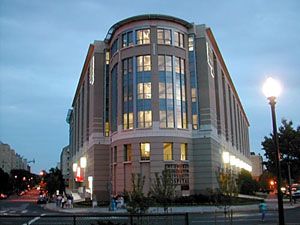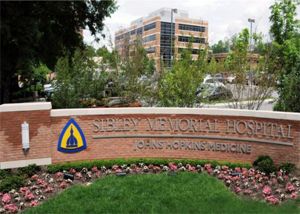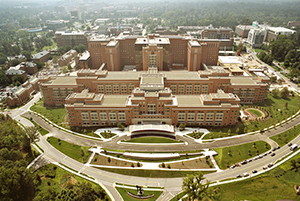Urology residents spend half of their adult clinical experience at The George Washington University Hospital and half at INOVA Fairfax Hospital. In addition, six consecutive months are spent in pediatric urology at Children’s National Health System as well as six consecutive months performing research at The George Washington University and The National Institute of Health.
George Washington University

The George Washington University Hospital is a new state-of-the-art hospital which opened in 2002, encompassing 371 beds, and 15,691 admissions a year. The ED is a Level 1 trauma center, and sees 61,185 patients a year. The hospital is located in the heart of the nation’s capital only blocks from the White House, State Department and many other national headquarters. As a result, the hospital serves a diverse group of patients, from area residents and homeless patients to visiting dignitaries and heads of state. The surgical experience encompasses a wide range of general and advanced urologic surgery from cystoscopic and ureteroscopic procedures to open prostatectomies to major oncologic surgery including open, laparoscopic and robotic prostatectomies, nephrectomies and cystectomies. Included are microscopic vasovasostomies and incontinence procedures including robotic culposuspensions and male and female slings. There is also a state of the art ambulatory center two blocks from the main hospital.
Sibley Memorial Hospital

Sibley is a non-profit, full service acute care community hospital serving the Washington, D.C. area since 1890. The campus is also home to an assisted living residence, Grand Oaks and The Sibley Renaissance which houses our Center for Rehabilitation Medicine, skilled nursing care and a residential Alzheimer's unit. A brand new inpatient tower was just opened in 2016 with 200 private beds along with a brand new 22 bed Emergency department and Fast-track.
Sibley Memorial Hospital is a proud member of Johns Hopkins Medicine.
NIH NCI Urologic Oncology Branch
The Urologic Oncology Branch conducts clinical and basic research designed to develop better methods for detection, prevention, and therapy of patients with genitourinary malignancies. The primary focus of the Urologic Oncology Branch is the study of the genes associated with initiation and progression of kidney and prostate cancers.

In the Urologic Oncology Branch, patients with hereditary forms of genitourinary malignancies, von Hippel-Lindau (VHL) disease, hereditary papillary renal carcinoma (HPRC), and hereditary prostate carcinoma are evaluated and treated by a multidisciplinary team. In the laboratory, studies are under way to determine the molecular mechanisms of kidney cancer and prostate cancer. The kidney cancer disease genes, the VHL gene, and the HPRC genes are studied. Studies of molecular genetics of renal carcinoma, including the role of the recently identified VHL tumor suppressor gene-the disruption of whose processes causes acquired or hereditary cancer-are under investigation. Studies of the subcellular localization and identification, both of the associated proteins and of the function of the VHL protein, are in progress, as well as the genomic and cytogenetic changes associated with the initiation of urologic malignancies. The role of tumor suppressor genes in prostate cancer is also under investigation. Study of the molecular biological changes associated with hereditary and sporadic prostate cancer is being carried out. This branch utilizes the findings of the molecular genetics of genitourinary malignancies to develop better methods for early diagnosis of both the hereditary and the nonhereditary (sporadic) forms of urologic malignancies.
Children’s National Health System
Children’s National Health System is the only exclusive provider of pediatric care in the Washington, D.C. Metropolitan area. It main campus is the only freestanding children’s hospital between Philadelphia, Pittsburgh, Norfolk, and Atlanta, treating more than 360,000 patients each year who come from throughout the region, nation and world. Children's Hospital houses over 279 inpatient beds and serves as the Level 1 Trauma Center for the District of Columbia, as well as the referral center for cancer, burns, neonatology, and critical care.